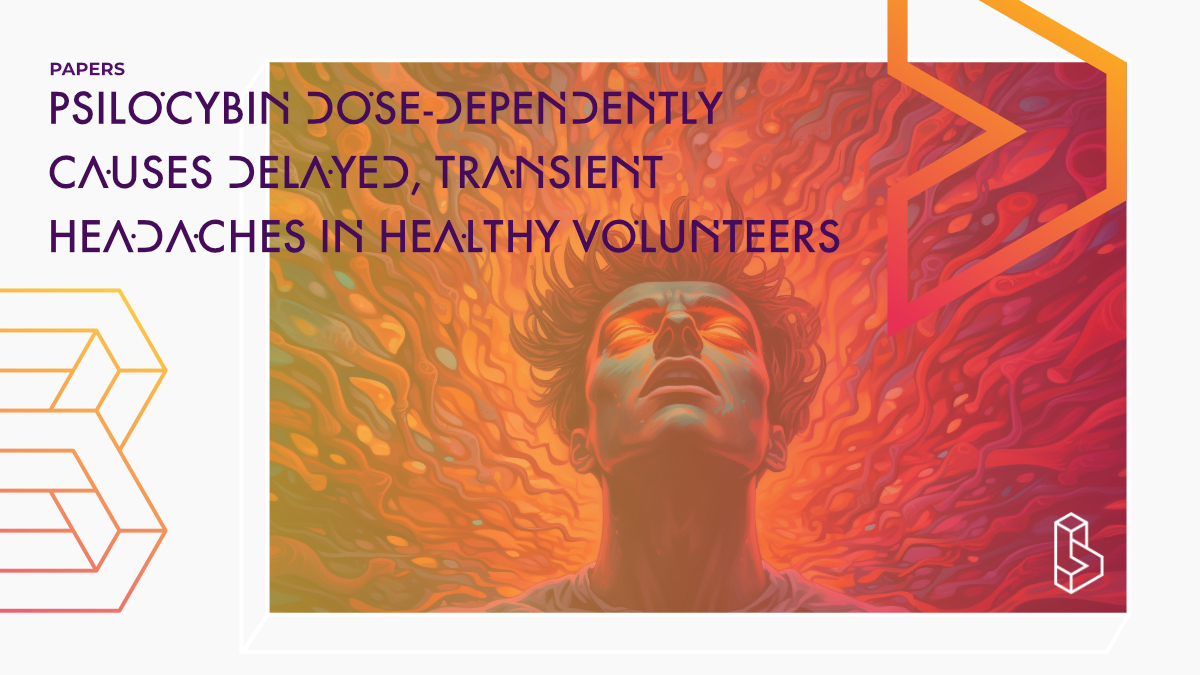This double-blind placebo-controlled study (n=18) found that psilocybin (5-30mg/70kg) frequently caused mild to moderate delayed and transient headaches in healthy volunteers in a dose-dependent manner.
Abstract of Psilocybin dose-dependently causes delayed, transient headaches in healthy volunteers
“Background: Psilocybin is a well-characterized classic hallucinogen (psychedelic) with a long history of religious use by indigenous cultures, and nonmedical use in modern societies. Although psilocybin is structurally related to migraine medications, and case studies suggest that psilocybin may be efficacious in treatment of cluster headache, little is known about the relationship between psilocybin and headache.
Methods: This double-blind study examined a broad range of psilocybin doses (0, 5, 10, 20, and 30. mg/70. kg) on headache in 18 healthy participants.
Results: Psilocybin frequently caused headache, the incidence, duration, and severity of which increased in a dose-dependent manner. All headaches had delayed onset, were transient, and lasted no more than a day after psilocybin administration.
Conclusions: Possible mechanisms for these observations are discussed, and include induction of delayed headache through nitric oxide release. These data suggest that headache is an adverse event to be expected with the nonmedical use of psilocybin-containing mushrooms as well as the administration of psilocybin in human research. Headaches were neither severe nor disabling, and should not present a barrier to future psilocybin research.”
Authors: Matthew W. Johnson, R. Andrew Sewell & Roland R. Griffiths
Summary of Psilocybin dose-dependently causes delayed, transient headaches in healthy volunteers
Mesoamerica and South America used psilocybin mushrooms for recreational and spiritual purposes. Psilocybin and LSD are considered classic hallucinogens, producing psychoactive effects that are similar and primarily mediated by 5-HT2A receptor agonism.
In a previous study, 36 hallucinogen-nave volunteers received mg/70 kg psilocybin and a comparison drug (40 mg/70 kg methylphenidate; a psychoactive “active placebo” used to maintain study blinding) in different sessions. Some participants reported headaches after psilocybin use, although the incidence was likely underestimated.
The mescaline experience was described by Mitchell as characterized by a left frontal pain and a dull occipital ache, and by Ellis as a slight headache that passed off the course of the morning. A report of 16 administrations of psilocybin to 13 participants in 1958 reported that 50% of the subjects reported headache, but did not provide further details. Two years later, a study reported that 5 of 14 volunteers reported headache, but did not provide further details.
Notes on Psilocybin dose-dependently causes delayed, transient headaches in healthy volunteers
This study analysed data from an earlier study by Griffiths and colleagues (2011).
Find this paper
Psilocybin dose-dependently causes delayed, transient headaches in healthy volunteers
https://doi.org/10.1016/j.drugalcdep.2011.10.029
Open Access | Google Scholar | Backup | 🕊
Cite this paper (APA)
Johnson, M. W., Sewell, R. A., & Griffiths, R. R. (2012). Psilocybin dose-dependently causes delayed, transient headaches in healthy volunteers. Drug and alcohol dependence, 123(1-3), 132-140.
Study details
Topics studied
Pain
Headache Disorders
Study characteristics
Original Re-analysis
Placebo-Controlled
Active Placebo
Double-Blind
Within-Subject
Randomized
Participants
18
Humans
Compound Details
The psychedelics given at which dose and how many times
Psilocybin 10 - 30mg | 5x
Linked Research Papers
Notable research papers that build on or are influenced by this paper
Psilocybin occasioned mystical-type experiences: immediate and persisting dose-related effectsThis double-blind, randomized study (n=18) investigated the effects of psilocybin at different dosages. It found that positive effects were most pronounced at 20/30mg per 70kg. At two and 14 months later, participants indicated positive changes and rated the experience as one of the top 5 life experiences.

